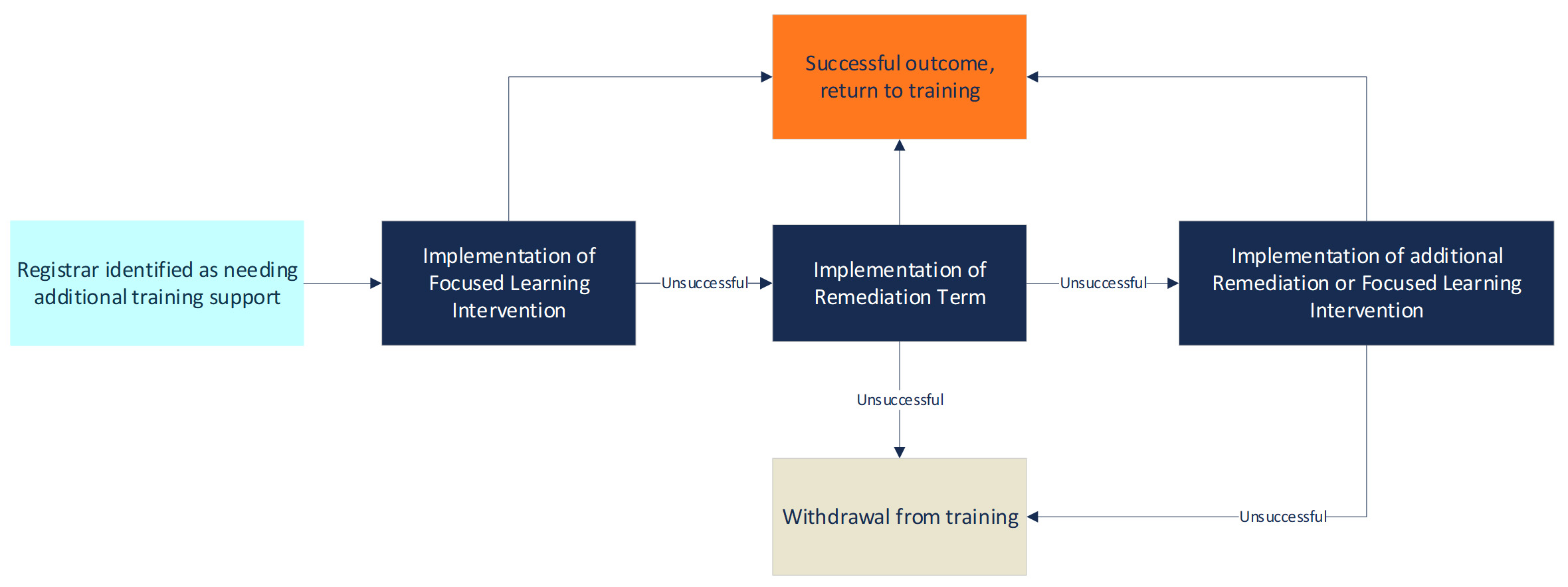Educational support
General practice is a broad and complex discipline and requires a wide range of skills and knowledge. Registrars come to GP training with varied skillset which is unique to each of you. The AGPT program is designed to facilitate the development of critical knowledge, skills and attitudes that are necessary for competent, unsupervised general practice.
Competency across the domains of general practice is relevant to every general practice consultation. Many registrars will gain the required skills and knowledge during the standard training program. However, for many different reasons a registrar may struggle to attain these competencies within the usual training program time or with the usual training program education and resources. Some registrars will require extra assistance in the form of Focused Learning Interventions (FLI’s) and Remediation terms to assist in your goal of achieving Fellowship and undertaking independent General Practice in Australia.
These educational interventions should not be viewed as punitive or judgemental, but rather as an opportunity to resolve ‘blind spots’ and address individual learning needs. Your training team has extensive experience in identifying and managing registrars in need of additional support. If your program team and regional team have concerns about your performance and progress, they’ll work with you to identify and implement the most appropriate, targeted educational support or intervention for your circumstances.
Performance issues that require support may be minor and transient or more significant and persistent; there may be a single issue or multiple issues.
Concerns about performance and progress might involve:
- communication skills
- clinical skills
- cognitive skills
- organisational, integrative and collaborative skills
- professional behaviour
- some AHPRA Addenda
- other serious issues that might be reportable, including:
- health and personal issues
- work environment and systems issues.
Our educational support has a stepped approach:
- early identification of registrars who need extra assistance
- provide appropriate assistance and support
- implement an educational intervention (eg focused learning intervention)
- implement remediation.

Figure 1. Approach to educational support when there is a concern about performance and progress
Focused Learning Interventions
Your medical educator (ME), supervisor or a clinical teaching visitor may identify that you have learning needs that require a focused learning intervention (FLI).
A FLI supports your learning with resources and activities to help address your learning needs.
You’ll work with your program team, training site staff and supervisor to develop a FLI specific to your needs. This collaborative approach is an important part of the process to ensure your particular needs are addressed.
The FLI is developed, implemented, and completed within your program time. Everyone involved in developing the FLI must agree on the timeframe for completion.
Unfortunately, not all registrars who complete an FLI will demonstrate sufficient improvement. If this is the case, you may be required to:
- undertake another FLI
- undertake remediation
- withdraw from training.
Remediation
A remediation term will be recommended by your training team when your progress through training is unlikely or unable to be completed within the usual training time, with the usual resources. Remediation is a critical educational intervention to help address concerns about performance and will ultimately help you progress towards fellowship,meet the requirements of the Fellowship Policy and the Competency profile of the Australian General Practitioner at the point of Fellowship. A remediation term suspends your training time and provides additional funding for targeted interventions to meet defined learning goals.
Applying for a Remediation Term
Your regional team will work with you to develop an individualised remediation plan and you must agree with the plan for it to proceed. The plan may involve additional education, supervision, assessment and pastoral supports to improve your areas of learning need. Depending on the nature of the learning need, refusal to engage in the remediation can result in withdrawal from the training program. This is a rare outcome but may apply if there are significant concerns about patient safety, professionalism or program compliance.
The regional team will apply to the National Remediation team to commence a remediation term. You’ll be notified of the outcome within 25 business days of the completed application being received. Please be aware that while waiting for approval of the remediation term you may be placed on Category 2 leave if we identify a potential safety risk to you or the community if you continue training without remediation in place. Your program team will work closely with you if this is the case. If the remediation application is approved, your program time will be suspended for the period of remediation, and you’ll be unable to enrol in or sit Fellowship exams while on a remediation term. Your progress will be monitored throughout, and progress reports will be submitted at the mid and end points of the term.
Remediation terms can occur at any time in training. There is evidence that early identification of the need for remediation results in shorter remediation terms and better learning outcomes. A remediation term is usually undertaken while continuing to work in community general practice. Most remediation terms can be conducted in the registrar’s current practice. However, depending on the relationship with the current practice and the degree of support needed, a move to a different practice and/or location may be required.
Outcomes of Remediation
In most instances, remediation is successful and the concerns about performance are addressed. The registrar is then able to resume the training program.
However, in some instances, an additional intervention (focused learning intervention) is required to address ongoing performance concerns. Occasionally, serious performance concerns remain at the end of remediation, and the result is withdrawal from the program. For more information about withdrawal, refer to Involuntary withdrawal.